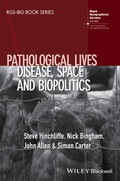Pathological Lives
Disease, Space and Biopolitics
RGS-IBG Book Series

1. Edition December 2016
262 Pages, Hardcover
Wiley & Sons Ltd
Short Description
Pandemics, epidemics and food borne diseases have become one of the key challenges for contemporary global society. The central claim of Pathological Lives is that any solution offered to these kinds of emerging and often communicable diseases requires a broad-based geographical scrutiny. The book marks an empirically and theoretically informed contribution, drawing together and extending empirically based geographical scholarship in human-environment relations, science and society, more than human geographies and spatial theory to understand and evaluate efforts at making life more secure.
Pandemics, epidemics and food borne diseases are a major global challenge. Focusing on the food and farming sector, and mobilising social theory as well as empirical enquiry, Pathological Lives investigates current approaches to biosecurity and ask how pathological lives can be successfully 'regulated' without making life more dangerous as a result.
* Uses empirical and social theoretical resources developed in the course of a 40-month research project entitled 'Biosecurity borderlands'
* Focuses on the food and farming sector, where the generation and subsequent transmission of disease has the ability to reach pandemic proportions
* Demonstrates the importance of a geographical and spatial analysis, drawing together social, material and biological approaches, as well as national and international examples
* The book makes three main conceptual contributions, reconceptualising disease as situated matters, the spatial or topological analysis of situations and a reformulation of biopolitics
* Uniquely brings together conceptual development with empirically and politically informed work on infectious and zoonotic disease, to produce a timely and important contribution to both social science and to policy debate
Series Editors' Preface x
Acknowledgements xi
Foreword xiii
Part I Framing Pathological Lives 1
1 Pathological Lives - Disease, Space and Biopolitics 3
Introduction: The Emergency of Emergent Infectious Diseases 3
The Four Moves of Pathological Lives 8
References 21
2 Biosecurity and the Diagramming of Disease 25
Disease Diagrams 27
The Disease Multiple: Germs and the Return of the Outside 31
Biosecurity and the Diagramming of Disease 34
Conclusions 47
References 49
3 Reconfiguring Disease Situations 52
Disease Situations 54
Microbial Life and Contagion as Difference and Repetition 67
A Topological Disease Situation 72
Conclusions 80
References 81
Part II Disease Situations 87
Introduction 87
References 89
4 'Just-in-Time' Disease: A Campylobacter Situation 91
Factory-Farmed Chicken and Food-borne Disease 93
Relational Economy of Disease 101
Powers of Life 107
Conclusions 108
References 109
5 The De-Pasteurisation of England: Pigs, Immunity and the Politics of Attention 112
Birth of the Sty 113
Pigs in Practice - Fieldwork and Translations 119
Immunity, Attention and More-than-Human Responses 132
Conclusions 139
References 139
6 Attending to Meat 143
Introduction 143
Mapping the Current Landscape of Food Safety 144
A Failure of Coordination? 151
Inspection as Tending the Tensions of Food Safety 154
Being Stretched 162
Conclusions 164
References 166
7 A Surfeit of Disease: Or How to Make a Disease Public 169
The Media Background to Disease Publics 171
Publicising Disease: From Public 'Understanding' to 'Engagement' 174
Understanding and Engaging Disease Publics 177
Understanding the Surfeit 179
Conclusions: Making a Disease Public 187
References 189
8 Knowing Birds and Viruses - from Biopolitics to Cosmopolitics 192
Sensing Life 193
A Livelier Biopolitics and a Noisier Sentience 198
A Perceptual Ecology of Knowing Birds 200
Surveying Life 204
Knowing Viruses 206
The Significance of Observation 208
Conclusions 210
References 211
9 Conclusions - Living Pathological Lives 214
Time-Space and Intra-Actions 216
A livelier Politics of Life 218
A new Kind of Emergency? 220
References 222
Index 223
Andrew Barry, Chair of Human Geography and Vice-Dean (Interdisciplinarity), University College London
'Multi-species worlds also include pathogenic microbes. How, for better or worse, to co-exist with these and face the challenges they pose - whilst avoiding the tropes of total warfare and eradication? Pathological Lives is an acute and well-researched book that bravely faces up to this concern and that sets the scene for a new wave of fresh thinking about biopolitics.'
Annemarie Mol, Professor of Anthropology of the Body, The University of Amsterdam
'Pathological Lives offers an illuminating new approach to the problem of emerging infectious disease. The authors outline a relational understanding of disease where host and infective agent are held together by infrastructures of greater or lesser pathogenicity. This book is a rare thing in contemporary social science: a combination of close ethnographic study, critical policy analysis, and a profound philosophical intervention into contemporary theories of life, biopolitics and emergence.'
Melinda Cooper, Associate Professor of Sociology and Social Policy, The University of Sydney
Nick Bingham is a Senior Lecturer in the Faculty of Social Sciences, The Open University, UK. Nick's current areas of research focus include the management of food safety, responses to the pollination crisis, and matters of coordination in smart cities. He is the author of numerous journal articles and book chapters and is joint editor of Contested Environments (with Andrew Blowers and Chris Belshaw, 2003).
John Allen is Professor of Economic Geography in the Faculty of Social Sciences, The Open University, UK. His teaching and research experience includes work on issues of power and spatiality, more recently in relation to financialization, privatization, biopower and topology. His publications include Lost Geographies of Power (Oxford, Blackwell, 2003) and Topologies of Power: Beyond Territory and Networks (2016), in addition to numerous authored and edited books. Simon Carter is a Senior Lecturer in the Faculty of Social Sciences, The Open University, UK. Hisresearch interests are in Science and Technology Studies, especially as applied to issues of health and medicine. Most recently, he has been working on an ESRC funded study into how biosecurity interfaces with other concerns in our globalized world. He is the author of Rise and Shine (2007) as well as numerous book chapters and journal articles.


